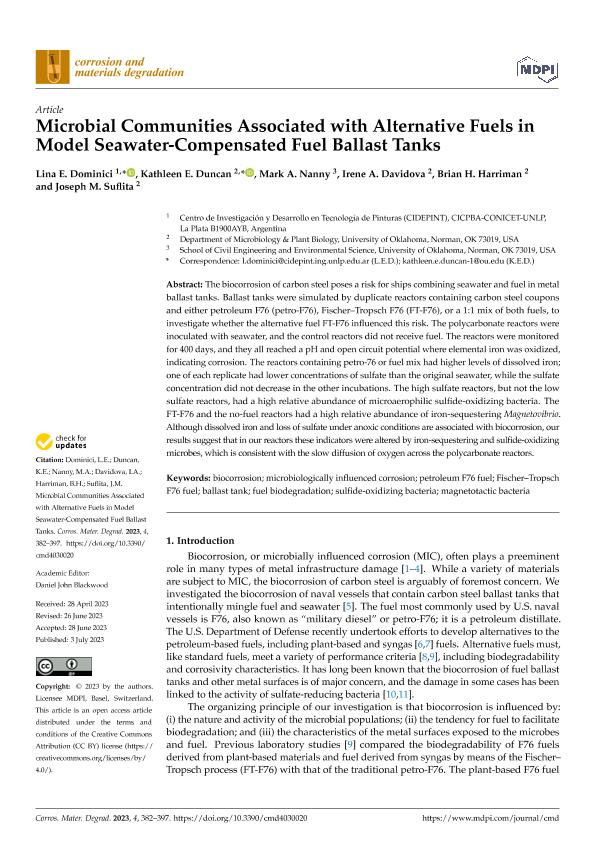Artículo
Microbial Communities Associated with Alternative Fuels in Model Seawater-Compensated Fuel Ballast Tanks
Dominici, Lina Edith ; Duncan, Kathleen E.; Nanny, Mark A.; Davidova, Irene A.; Harriman, Brian H.; Suflita, Joseph M.
; Duncan, Kathleen E.; Nanny, Mark A.; Davidova, Irene A.; Harriman, Brian H.; Suflita, Joseph M.
 ; Duncan, Kathleen E.; Nanny, Mark A.; Davidova, Irene A.; Harriman, Brian H.; Suflita, Joseph M.
; Duncan, Kathleen E.; Nanny, Mark A.; Davidova, Irene A.; Harriman, Brian H.; Suflita, Joseph M.
Fecha de publicación:
07/2023
Editorial:
MDPI
Revista:
Corrosion and Materials Degradation
ISSN:
2624-5558
Idioma:
Inglés
Tipo de recurso:
Artículo publicado
Clasificación temática:
Resumen
The biocorrosion of carbon steel poses a risk for ships combining seawater and fuel in metal ballast tanks. Ballast tanks were simulated by duplicate reactors containing carbon steel coupons and either petroleum F76 (petro-F76), Fischer–Tropsch F76 (FT-F76), or a 1:1 mix of both fuels, to investigate whether the alternative fuel FT-F76 influenced this risk. The polycarbonate reactors were inoculated with seawater, and the control reactors did not receive fuel. The reactors were monitored for 400 days, and they all reached a pH and open circuit potential where elemental iron was oxidized, indicating corrosion. The reactors containing petro-76 or fuel mix had higher levels of dissolved iron; one of each replicate had lower concentrations of sulfate than the original seawater, while the sulfate concentration did not decrease in the other incubations. The high sulfate reactors, but not the low sulfate reactors, had a high relative abundance of microaerophilic sulfide-oxidizing bacteria. The FT-F76 and the no-fuel reactors had a high relative abundance of iron-sequestering Magnetovibrio. Although dissolved iron and loss of sulfate under anoxic conditions are associated with biocorrosion, our results suggest that in our reactors these indicators were altered by iron-sequestering and sulfide-oxidizing microbes, which is consistent with the slow diffusion of oxygen across the polycarbonate reactors.
Archivos asociados
Licencia
Identificadores
Colecciones
Articulos(CIDEPINT)
Articulos de CENTRO DE INV EN TECNOLOGIA DE PINTURAS (I)
Articulos de CENTRO DE INV EN TECNOLOGIA DE PINTURAS (I)
Citación
Dominici, Lina Edith; Duncan, Kathleen E.; Nanny, Mark A.; Davidova, Irene A.; Harriman, Brian H.; et al.; Microbial Communities Associated with Alternative Fuels in Model Seawater-Compensated Fuel Ballast Tanks; MDPI; Corrosion and Materials Degradation; 4; 3; 7-2023; 382-398
Compartir
Altmétricas



